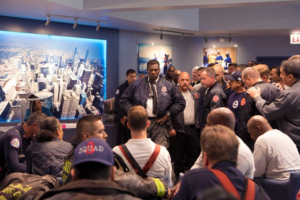
Shocking Update: How Eamonn Walker and the Chicago Fire Cast Use Laughter to Tackle Heavy Storylines
A Balancing Act Between Drama and Humor
Chicago Fire is known for its intense, action-packed storylines, often centered around life-and-death situations, complex personal struggles, and the emotional toll of being a first responder. However, amid the heavy drama, the show’s cast, led by Eamonn Walker (who portrays Chief Wallace Boden), has discovered the power of humor as a way to balance these intense moments. What might surprise fans is how the cast incorporates laughter into the show’s often somber and gritty environment, using humor as a tool to cope with and navigate the darker aspects of their characters’ lives.
In recent seasons, Chicago Fire has faced some of its most heart-wrenching and intense episodes, from the tragic loss of colleagues to the personal struggles of the firefighters and paramedics at Firehouse 51. These storylines often leave fans emotional and on edge, but what sets the show apart is its ability to intersperse moments of levity that provide much-needed relief without undermining the gravity of the situation. This delicate balancing act is part of what makes Chicago Fire so relatable to its audience and so deeply compelling.
Eamonn Walker’s Approach to Humor
Eamonn Walker, known for his portrayal of the strong and stoic Chief Boden, has long been praised for his ability to bring depth to his character. However, what many viewers may not realize is that Walker himself is a key figure in using humor to break the tension on set. As a seasoned actor, Walker understands the importance of lightening the mood during intense shooting days, particularly when the material can be emotionally draining.

He has spoken about the role humor plays in creating a positive and supportive atmosphere on set. “When you’re working on scenes that are as heavy as the ones we often do on Chicago Fire, laughter is essential,” Walker has said in interviews. “It’s a way for the cast to come together, decompress, and keep morale high. You can’t always be in an emotional state of intensity—it’s important to balance that out.”
Walker, along with his fellow cast members, often finds ways to bring humor into their interactions, even during the most tense moments. Whether it’s through witty one-liners or lighthearted banter between characters, these moments help to humanize the firefighters and paramedics, showing that even in the midst of chaos, they remain close-knit and able to find humor in the darkest of times.
Humor as a Coping Mechanism
For many of the characters on Chicago Fire, the job is a constant source of stress, danger, and emotional weight. In a profession where life is often unpredictable, laughter becomes a vital coping mechanism. Chief Boden, who is often seen as the rock of the team, may have a serious and commanding presence, but even he knows the importance of humor to relieve the pressure.
In addition to creating a lighter atmosphere on set, humor plays an important role in character development. The dynamic between characters like Boden, Matt Casey, and Kelly Severide (played by Jesse Spencer and Taylor Kinney, respectively) is strengthened by their ability to laugh together, even after facing moments of extreme trauma or stress. Their camaraderie becomes more authentic because of these shared moments of levity.
This use of humor also has an impact on the audience. Fans who are emotionally invested in the characters’ journeys can relate to the moments of lightness that come after a particularly heavy episode. It allows viewers to experience the highs and lows of the characters’ lives in a more holistic way, offering a realistic portrayal of how first responders cope with the dangers and emotional toll of their profession.
Moving Forward with Laughter and Drama
As Chicago Fire moves into its next seasons, it’s clear that the cast, particularly Eamonn Walker, will continue to use humor as an essential tool to navigate the show’s heavy storylines. By mixing drama with lighthearted moments, the series maintains its emotional depth while offering relief from the constant intensity. This approach not only strengthens the relationships between characters but also helps the show resonate with its audience on a deeper level.
In the end, Chicago Fire proves that laughter can coexist with drama, and sometimes, it’s the perfect antidote to even the darkest of times. As Eamonn Walker and his castmates continue to find ways to balance humor and heavy material, viewers can expect more emotional storytelling, with just the right amount of levity to make it all the more impactful.